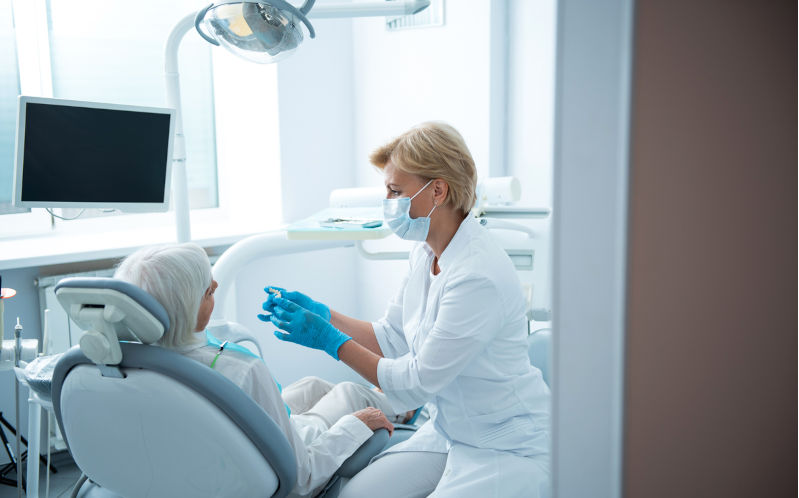We can no longer ignore the poor oral health of older people
September 17, 2024
It is a sad reflection on medical care in Australia that the mouth seems somehow to be disconnected from the body. Doctors and nurses are poorly trained to examine the mouth and oral health is not funded under Medicare.
The importance of oral health as a risk factor for cardiovascular disease, respiratory ailments, diabetes and dementia is now well understood.
There is no demographic with poorer oral health than older people, especially those in residential aged care.
For this group, poor oral health has a profound impact on quality of life, including comfort, eating, speech, appearance and the ability to socialise. Older people are particularly susceptible because of polypharmacy and iatrogenic dry mouth.
Poor oral hygiene is known to increase the rate of cognitive decline, the risk of respiratory infections, diabetes, cardiovascular disease and cerebrovascular disease and interferes with the management of Parkinson’s disease.
A report from the Victorian Department of Health reveals that 70% of Victorians over 75 have moderate to severe periodontitis, a serious, albeit preventable, gum infection.
The Australian Institute of Health and Welfare estimates 67,000 hospitalisations could be prevented each year by earlier detection and treatment of dental conditions.
Recommendation 60 of the Final Report of the Royal Commission into Aged Care Quality and Safety called for a Senior Dental Benefits Scheme to provide dental services to older people including people in residential aged care.
The holy grail is to get oral health into Medicare, but that won’t help people in residential aged care. Their problem is mainly oral hygiene and access to dentists is difficult.
Recommendation 38 of the Final Report of the Royal Commission into Aged Care Quality and Safety recommended approved providers to employ, or otherwise retain, allied health professionals. This included an Oral Health Therapist. This is a much cheaper option that would answer most of the oral health needs of older people in residential care.
The Senior Smiles preventive oral health program is closing the gap in the provision of oral health care for the ageing population living in residential aged care facilities.
The program places Oral Health Practitioners (Oral Health Therapists or Dental Hygienists) in aged care facilities to conduct oral health risk assessments, formulate oral health care plans and provide appropriate referrals for timely dental treatment.
The Oral Health Practitioner also provides oral health instruction and education to residents, carers and staff.
The Senior Smiles Oral Health Practitioners visit the facility weekly to conduct oral health risk assessments and care plans of all new residents and existing residents identified with possible problems. Referrals are then made to local dentists or dental prosthetists if appropriate.
The benefits include improved quality of life through food enjoyment; appearance; reduced pain and oral discomfort; reduced risk of respiratory infections, including pneumonia; improved nutrition and lower prevalence of unexplained weight loss; timely management of dry mouth; and decreased hospital admissions and mortality.
UK research suggests that every $1 invested in Senior Smiles results in $3-$4 savings to the healthcare system and $3-$4 savings in social benefits (QALYs).
The Senior Smiles Program was tested in five RACFs in the Central Coast in 2015 to 2017 under the direction of Honorary Professor Janet Wallace of the School of Health Sciences, University of Newcastle.
This followed an Australian Government initiative in 2010, known as Better Oral Health in Residential Care. This “train the trainer” initiative provided RACF with resources to support staff training in good oral health practices for residents. BOHRC infiltrated 89% of Australian RACFs and aimed to promote a nationally consistent approach for better oral health in Australian RACFs.
BOHRC was very successful, with more than 4885 RACF nurses trained in oral health care and a sophisticated package of oral health resources developed and distributed. The training was appropriate, the resources sound, but the reality is that RACF staff are focused on other care needs and oral health continues to be managed poorly in the majority of RACFs.
Disappointingly, oral health care in RACFs has reverted to the situation prior to BOHRC.
The Senior Smiles model of care was successful in providing oral health care for older people living in five residential aged care facilities on the NSW, Central Coast. The funding was, however, only short term.
Establishing Senior Smiles would require each RACF to have an Oral Health Therapist or Dental Hygienist for one day per week, costing $25,000 per facility, per annum. In addition, disposables (including mouth camera) would cost $5000 per RACF per annum.
This seems to be a trivial cost to solve the enormous problem of poor oral hygiene among older people in residential care and the consequent costs in quality of life, morbidity, and preventable hospital admissions.

